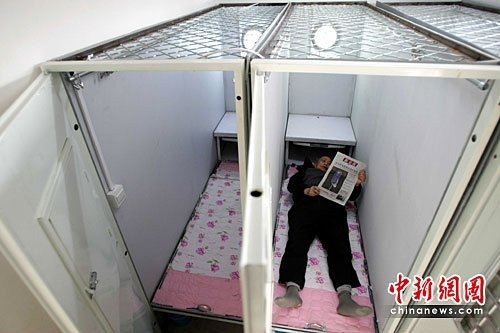Throwback Thursday: When Beijing Got Its First Capsule Apartments
Throwback Thursday takes a look back into Beijing's past, using our 12-year-strong blog archives as the source for a glance at the weird and wonderful stories of Beijing's days gone by.
Anyone who has ever re-signed a housing contract in Beijing will be well acquainted with the sour reality of the city's real-estate market: prices rarely go down. In fact, according to some analysts, if it weren’t for controversial hukou policy that limits who can own property within the city limits, rent prices in Northern Capital might quickly erupt to look much more like the towering and outrageous prices of Eastern Capital, also known as Tokyo.
In that city, as you may have heard, rent can be so unbearable that many residents have opted to live “capsules” – the type too large to swallow, but far too small to be called an apartment. It was ten years ago this month that Beijing followed suit and opened its first capsule complex in Haidian District.

Photos from Chinanews.com capture the man behind the project, Huang Rixin, 78 years old at that time, lounging in one of the capsules to show off just how comfortable his tenants would be. The capsules are not the futuristic, round-walled pods that you might have seen in YouTube tours of their Japanese counterparts. Floral padding lines the "bed" that takes up less than two square meters of space, and white walls only a couple of feet apart support a metal fence "roof" that would be more suited to a prison. Down below, a small storage space, accessible when the capsule's door is open, allows guests to keep a few possessions around without cluttering their limited space.
China Hush recorded a few translated comments from QQ (now there’s another throwback for you!) in response to the complex’s opening. One netizen wrote, "Today there are two interesting headlines. One is 'Capsule Apartments,' while another is '875,000 Billionaires in our Country, Mostly in the Real-Estate Industry.'"
Even we compared the capsules to a recently constructed "super-luxurious apartment building complex," concluding, “With many Chinese people still living in terrible conditions and the kids of migrant workers unable to even go to school, can the super-wealthy really think of no better way to spend RMB 1 million?"
While it is proper and upright Marxism to blame the ultra-wealthy for the living conditions of the poor from a systematic perspective, it would be a crime to blame Huang, who did not found the complex for profit, but as a way to help out struggling youth, providing them with a viable alternative to the “ant” lifestyle in which many young migrants and fresh college graduates find themselves exiled to crowded underground communities.

Even though the old man once quipped that “Yao Ming could comfortably live in one of these capsules,” you did not have to make NBA money to afford one of these rooms, which Huang began renting out for RMB 50 per month, or as low as RMB 20 per month if a tenant was really struggling. The capsules are not meant as a permanent solution, of course, but as a transitionary measure.
After starting with just eight capsules, Huang eventually built over 100 of the tiny domiciles, proving that even very little things can make a difference.
READ: Throwback Thursday: The Biggest Beijing Rock Concert That Never Was
Images: Baidu, Chinanews







